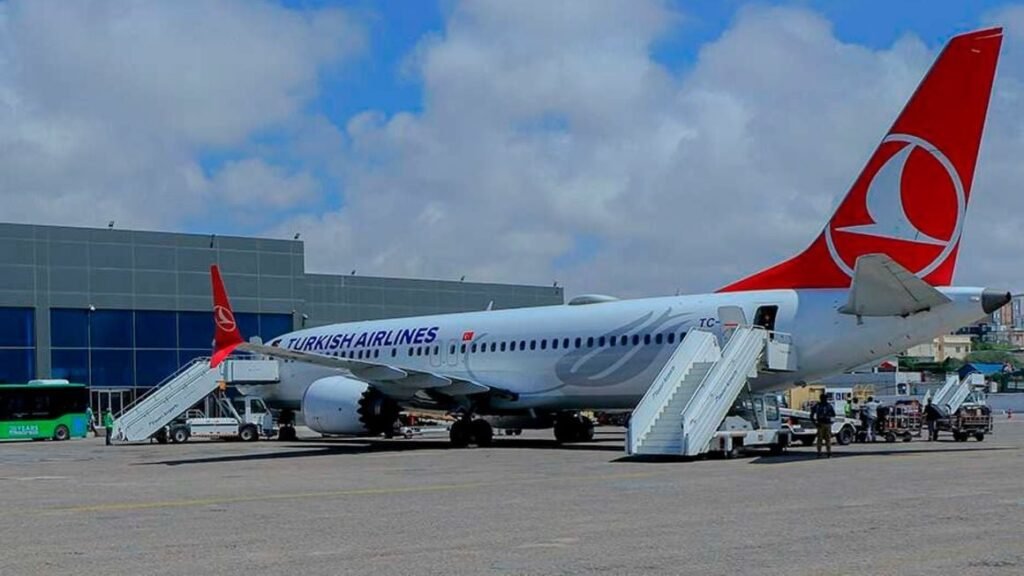By Mohamed A Yasin
Somalia’s government appears to be caught in an alternate reality, where the security situation is “better than ever,” despite international airlines canceling flights, Western embassies sounding alarm bells, and Al-Shabaab gleefully proving them all right.
While EgyptAir, Qatar Airways, and Turkish Airlines scramble to avoid an impending disaster, President Hassan Sheikh Mohamud insists that everything is just fine—perhaps hoping that if he repeats it enough, reality will adjust accordingly.
Airlines Bail Out While Government Wonders Why
On March 5th, major airlines abruptly suspended flights to Mogadishu, citing “security concerns.” No long-winded explanations, no debate—just a quick decision based on intelligence that the Somali government, in its infinite wisdom, dismissed outright.
Somalia’s Minister of Transport and Aviation, Fardowsa I. Igal, was left scratching her head, seemingly perplexed those airlines took their cues from the U.S. Embassy rather than from her government’s reassurances.
“There is no risk that justifies these cancellations,” she boldly declared, as if airlines were in the habit of shutting down profitable routes just for fun.

Turkish Airlines reportedly responded that they acted on the security advisory from the U.S. Embassy—a move that was neither shocking nor optional. What the minister failed to grasp is that insurance companies hold more sway over airlines than government statements do. If an airline ignores an advisory from a reputable source like the U.S. Embassy, their insurance certificates vanish faster than a politician’s campaign promises.
The U.S. Embassy: Take Cover Immediately
Unlike the Somali government, the U.S. Embassy wasn’t taking chances. It bluntly warned American citizens of “credible information regarding potential imminent attacks.” The advisory named Mogadishu’s airport, hotels, restaurants, and government buildings as likely targets—essentially everywhere a person might hope to find safety.
For embassy personnel, movement restrictions were immediately imposed, proving once again that when it comes to security, those with actual intelligence reports don’t gamble with lives.
This warning coincided with a ramped-up U.S. military campaign in Somalia. Since President Donald Trump’s return to office, AFRICOM has been lighting up militant hideouts across Somalia, increasing airstrikes on Al-Shabaab and ISIS targets. While the Somali government may brush off security concerns, the U.S. military clearly isn’t taking any chances.
Reality Check: The “Proof is in the Pudding” (or in This Case, the Bombings)
President Hassan Sheikh Mohamud, determined to prove his point, took to the Presidential Mosque to reassure the nation. With unwavering confidence, he declared that there was “no security threat” and accused Western diplomats of spreading “fear-mongering propaganda.”
Unfortunately for him, reality has a way of crashing the party. Just last week, as Ethiopian Prime Minister Abiy Ahmed touched down in Mogadishu, Al-Shabaab extended their warmest greetings—with explosions at the airport’s security perimeter.
Not content with just that, Al-Shabaab also stormed Balcad district—just 25 minutes outside Mogadishu—where they freed prisoners and left Somali security forces scrambling. If these incidents aren’t proof of an “imminent security threat,” then what exactly qualifies?
The President is Alone on This One
With the airlines following embassy warnings, the Federal Member States (FMS) increasingly distancing themselves, and security deteriorating under his watch, President Hassan Sheikh Mohamud is finding himself politically stranded. Three FMS have already cut ties with his administration, signaling that trust in his leadership is dwindling faster than Mogadishu’s international flight schedule.
Yet, in a display of irony so rich it could buy its own real estate in Dubai, the Somali government has now volunteered to mediate Sudan’s conflict between the Sudanese Armed Forces (SAF) and the Rapid Support Forces (RSF). That’s right—a government that can’t even open dialogue with its own Federal Member States is now offering to solve someone else’s civil war. Perhaps next, they’ll offer marriage counseling to Hollywood celebrities.
The Disconnect Between Rhetoric and Reality
The Somali government’s stance is becoming harder to defend by the day. While it continues to insist that all is well, airlines are grounding flights, embassies are reinforcing security, and Al-Shabaab is demonstrating—almost on cue—that the warnings were justified.
This growing gap between rhetoric and reality raises serious questions about the government’s credibility. And in a world where actions speak louder than words, one thing is clear—when it comes to security, the Somali government is talking, but nobody is listening.
Mohamed A Yasin
Email: moyasin680@gmail.com


Leave a Reply